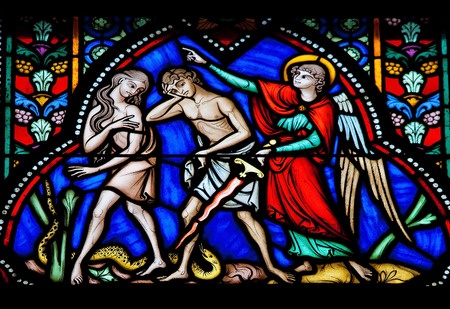
Weapon-bearing God is depicted on this cathedral window in Brussels, Belgium, banishing disobedient Adam and Eve from the Garden of Eden.
In a judge-not-lest-ye-be-judged world, perhaps so many of us are convinced that God will judge us harshly because we so boldly and blithely do the same to God. Even more sassy, we actually bear false witness against God; so the expectation that something horrific will befall us is both reasonable—and reciprocal.
Imagine this: You answer your door and police announce that you’re under arrest on suspicion of mass murder.
Huh?
At the station, you’re never interrogated. There is no arraignment, no trial. You never face your accuser, who apparently made an anonymous call to the police. No one searches the crime scene. There’s no evidence that you were there and, as far as you know, there were no bodies found.
No witnesses come forth. No loved ones come to your defense. No friend or colleagues insist that you would never do something so cruel. You’re simply judged guilty as charged.
Would you call that justice? Hold that thought.
Now, think about what you did when you heard that God committed indisputably inhumane acts. Did you ask any questions? Did you demand proof, or did you simply retell the story as if it was true? Let’s consider a few stories we like to share:
Adam and Eve: God is Unforgiving and Abusive
The Adam and Eve story, which has been accepted as an accurate historical account, portrays God as a heartless parent with unrealistic expectations. First, we have no evidence that humans can be created from dirt or bone or that infancy, childhood and puberty can be bypassed and humans can be born as adults with fully functioning brains.
Second, these two are ancestors of Neanderthals. Did they have the intellect to comprehend a directive not to eat something growing on a specific tree?
Why do we find it plausible that the all-knowing God expected obedience from these two? Why do we think that God would be outraged by their low mental acumen, judge it as disobedience and punish them so cruelly?
If we believe they were really human, that constitutes child abuse. If we believe that God banished them, and we tell others without proof of it, there’s no other way to say it: we bear false witness.
The Great Flood: God is Unforgiving and Genocidal
In the epic story of the Great Flood, which is found in numerous ancient myths, God declared that men were innately wicked and evil [Gen 6:5-8] and judged “all flesh” for being corrupt and violent [Gen 6:11-22]. The All-Powerful, All-Knowing’s most divine solution? Destroy almost every living thing [Gen 7:23].
Then, in an apparent admission that it was not such a good idea, promised never to do it again [Gen 9:1-17] and proceeded to repopulate the earth with fleshy humans who, by all accounts, haven’t stopped sinning. But then, how could we when God allegedly saddled us from birth with the burden of a sin committed by a witless guy made from dirt who was tricked by a talking snake?
Many beliefs not only insult our intelligence; they insult God’s goodness. We have been discouraged, even threatened, against questioning acts that seem more suited to Satan than God. We have been so intimidated by humans that we won’t give God the respect of using the brain we’ve been given. We don’t want to be outcasts, so we choose to go with the crowd, bear false witness against God rather than demand proof that God has so little regard for human life.
Job: Do We Bear False Witness when We Accuse God of Sadism?

Does a story claiming that God was a party to the sadistic treatment of a devout servant named Job bear false witness against God? Image: Sweet Publishing (http://sweetpublishing.com)
The Book of Job is painful for a number of reasons, particularly if we read it literally. It claims that God entertained a suggestion by Satan that his good and faithful servant Job was only good and faithful because God had blessed him with prosperity and a beautiful family. In other words, God cared what Satan thought and sought to prove him wrong by allowing Satan to do indescribably sadistic things to Job: Kill all his children and servants, take all his wealth and inflict him with open sores and agonizing physical pain.
God restores his wealth and gives him more children—as if one child can merely be replaced by another. Why do we accept this as a “happy ending” to the Job story?
Is it any wonder that nearly a third of Earth’s inhabitants—2.2 billion, at last count—believe that we need to be “saved” from God’s uncontrollable wrath. They are convinced that God will pour unending, sadistic punishment upon us. Based on these stories, they’ve drawn a logical conclusion.
What’s not logical is that these same people pray to this heartless, genocidal and sadistic god when they need something or when they are suffering. They even claim to love a god who has absolutely no regard for the pain and suffering of reportedly flawless humans such as Job or Jesus. Why do they think that God would relieve them from their torment?
The double-minded disconnect
Our thoughts, beliefs and behaviors appear to wildly conflict. Either genocide is a crime or it isn’t. Either sadism is good or it isn’t. If neither is good, why do we believe God did it? And why, because we believe God did it, do we decide that genocide or sadism is good—under certain circumstances?
We justify and even worship this behavior, cloaking it in the “one of God’s mysteries” explanation or the “human mind cannot understand the ways of God” excuse. But there is no mystery here: We hold humans to a higher standard of behavior than God. We also give humans a benefit that we don’t grant God: The benefit of a doubt.
If you think it’s unjust for you to be convicted without proof, don’t you think the same holds true for God?

